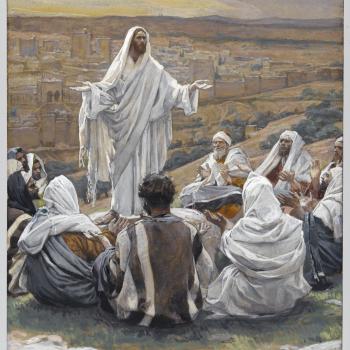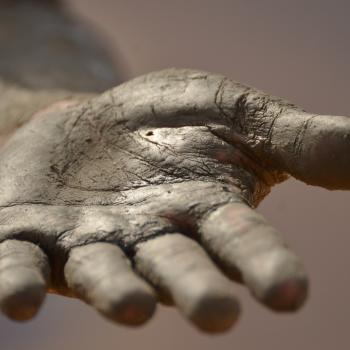“So it is good to take a break occasionally—from preaching as from fishing—to repair your nets,” so says Ludolph, one of my medieval guides. As we enter the summer season, I find his counsel so good. June invites me to take a break—from preaching, from teaching, from grading; from PowerPoints and syllabi and schedules. June invites me to return to Ludolph* to help me repair my nets. They got a little worn this year, even threadbare in places.
“After choosing the apostles, the Lord Jesus delivered that long and very beautiful discourse that, as Augustine says, gives to those who study it devoutly and calmly the perfect model of Christian life and all the precepts that should shape the behavior of a follower of Christ.” The Mount, and its Sermon, sounds like a good place to sit while I mend nets.
Blessed are the poor in spirit. “It must be understood that here poverty of spirit signifies avoiding love of the world, that is, of those things that the lover of this world seizes and holds onto. … This beatitude should be understood in a twofold sense: first, contempt for wealth and carnal pleasure; second, disregard for yourself and your own talents.” So, for the first sense: contempt for wealth and carnal pleasure. Summer is full of earthy pleasures, and this is not what carnal means. That blooming peony, the riotous fire spinner, the warmth of sun and the splash of lake water, the fresh arugula from the garden, the summer concert on the green—these are all earthy, fleshly, sensual. To have contempt for carnal pleasure is not to disdain our human senses and the divine gifts. Carnal pleasures are earthy pleasures that have not been given by God but are seized anyway.
As for the second sense—“disregard for yourself and your own talents.” This is so much harder, for some of us, than the avoidance of carnal pleasures. We are—all day, every day, in every way—invited to promote ourselves, to display our achievements, signal our virtues, defend our identities. We demand to be recognized. Disregard for myself is a long labor of love for God.
Blessed are the meek. “The meek are those who maintain equanimity of spirit and persevere in doing good.” “True justice is marked by compassion, false justice by contempt.” How often does contempt factor into our attitudes toward those who, we believe, are perverting justice? Meekness does not preclude strength; rather, it has so much strength that it does not need contempt. It perseveres in doing good with a spirit of tranquility, of inner strength, of confidence in God.
Blessed are those who mourn. Ludolph cites Chrysostom, who writes with prescient clarity about our own day: “If there is ever a time to mourn, it is in this present life, so full of the dishonor of evils, and in which we behold daily such an accumulation of shameful deeds that were we to consider them one by one we could not hold back our tears.” (Take a moment and list the evils and shameful deeds of our day.) But then he brings it even closer to home: “If a stranger came from a distant land and saw the way we flout Christ’s teaching by our way of life, he would conclude that we were God’s enemies, opposed to Christ’s precepts. Indeed, it would seem to him that we made a special study of how to act contrary to his commands in every way we could.” Ouch. Those evils and shameful deeds are also present in the Church, where they so glaringly refute all that we teach about the way of Christ. And so we mourn, “for our own sins and miseries, for the sins and miseries of others, for the sufferings of this life.”
Blessed are those that hunger and thirst after righteousness. “To hunger for justice means that you desire to shape your life in accord with God’s justice.” This certainly challenges our bizarre fixation on shaping our lives according to our own sense of identity, justice, rights, privileges, expectations. We don’t get to define true justice. God does.
Blessed are the merciful. “There is a certain order to be observed in the exercise of mercy. In the first place we should be merciful to ourselves after we sin… Next we should be merciful to our neighbors, putting up with their faults and even going so far as to lay down our lives for them. … So great is this virtue that God attributes it to himself as his distinctive attribute.” Only those who long for the righteousness of God can truly be merciful. Without that plumbline, we merely condone, tolerate, accept, or overlook the brokenness. Sometimes we even celebrate it and promote it. True mercy recognizes that God’s righteousness alone can make us whole.
Blessed are the pure of heart. “Through this beatitude God’s image in us is repaired, that is, our capacity to know and love God.” Many popular voices—even Christian ones—tell us that seeing God, knowing his love, enjoying his presence can all be achieved through right thinking or right actions or right political postures or right alliances or right experiences, and they conveniently leave aside this business of purity of heart. Jesus told us that all the nasties come straight from our hearts (Mt 15.19). Without purity of heart, we cannot see God.
Blessed are the peacemakers. “Peacemakers make peace first within themselves, courageously expelling all evil thoughts, words, or deeds as soon as they detect them. Nor do they allow any kind of commotion to disturb their inner realm; if adversity befalls them they preserve their peace of mind and appraise everything with a calm spirit. … Whether for themselves or for others, they vigilantly strive to make peace, restore peace, and preserve peace.” Peace starts with ourselves, and it cannot be had apart from the Holy Spirit (Jn 20.21-22). “Such peace has five enemies: wars, lawsuits, rebellion, disorder, and annoyance.” Notice how Ludolph proceeds from the most obviously disruptive to the least obviously disruptive, from the most social to the most personal. They are, of course, linked. Putin’s war stems from his annoyance with Ukraine’s independence. Tend to your annoyances. They bring wars.
Blessed are they that suffer persecution for righteousness’ sake. “This beatitude helps us suffer well, just as the previous beatitudes help us act well; virtue entails enduring as well as doing.” While there is genuine physical persecution going on around the world, even we protected ones can suffer persecution. Part of these might be the annoyances just mentioned. A small suffering, in comparison, but one that must be approached with peace.
Ludolph summarizes his discussion about the Beatitudes by again quoting Chrysostom:
In enumerating the beatitudes Christ has each depend on the one that went before, weaving them together into a kind of golden chain. It follows that those who are humble will be meek, that the meek will weep over their sins, that those who weep over sins will hunger and thirst for justice, that just people will also be merciful, that those who are just and merciful will feel remorse and be clean of heart, and from this comes peace. Having been perfected to this point, there is no doubt that they will be prepared for dangers, able to endure insults of any kind and thousand evil deeds.”
I think I’m going to start with the annoyances. They remind me of how very poor my spirit is, that I can be irked by so many things. “I am poor and needy, yet the Lord takes thought for me” (Ps 40.17).
Note: For a brief introduction to Ludolph, read this.
Image courtesy of David Mark from Pixabay.














